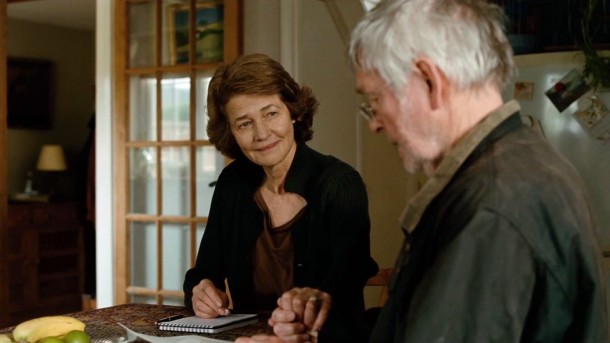Early on in 45 Years, Tom Courtenay’s Geoff receives a letter from Switzerland pertaining to a significant event (which I will not reveal here) which occurred long before he met his current wife, Charlotte Rampling’s Kate. How quickly this news seeps into and to quote Kate “taints” everything they have together is a disquietly terrifying notion, and how the two react to their life becoming their lives is the principle concern of Andrew Haigh’s film, his follow up to 2011’s equally subtle and heartbreaking Weekend.
Time is crucial in 45 Years. The eponymous duration Kate and Geoff have been married. The 50 years the event has remained frozen, before thawing and bringing to bear on the couple. The weeklong timeframe that the film occupies, the days leading up to an anniversary party causing fissures in their relationship that may kill dead anything worth celebrating. Time is an indefatigable and quietly oppressive force, sometimes gently pushing, other times dragging against will. Never explicitly the point of 45 Years, it’s an ever present undercurrent.
“I can’t be cross at something that happened before we existed.” Spoken early by Kate, the words soon gain weight as her trying to convince herself of this when faced with the opposite inevitability occurring. Interestingly Kate is the main focus of 45 Years, a character type typically relegated to simple reactive outrage and heartbreak but here given centre stage. As we follow the emotional fallout in its relation to her, Kate possesses greater agency than analogous figures in similar films. In charge of organising the part, getting up first to walk the dog and, most subtly, Geoff’s reliance on her driving him to the nearby town all neatly physically underscore the power she has within their relationship, a power suddenly finding itself adrift as her husband becomes more remote.
“I can’t be cross at something that happened before we existed.” And yet that something didn’t simply happen before they existed, it will now continue to happen, day after day, for the years to come echoing out in the open or buried under their every interaction like a shout in a mountain crevice. As previously said, time is the shackle of everyone, and this is especially true of the elderly. Kate and Geoff have never had children, supplementing the fact with multiple dogs. Their house has become living crypt they’ve happily walled themselves into, where they reside unspoken amongst the past while ostensibly living in the present.
Though there are no photos in the house – a regret, as Kate remarks that they “didn’t see the point” in their youth – the music ensures they’re perpetually tied to the past (there is no score in the film, enhancing the isolation of age). No song from later than 1969 is heard or referenced and so every song is imbued with a sense of purpose, that there’s memory hanging in the music. Likewise for the myriad objects directly and indirectly related to the slim narrative. The letter, the photo, the slides, Kate’s piano, nothing now is new; everything comes burdened with choices taken, choices which as Geoff remarks in his speech at the film’s climax become fewer and fewer with every passing day.
“I can’t be cross at something that happened before we existed.” Ultimately 45 Years is the story of a couple, of a relationship longer than most put under a degree of strain it previously had never encountered. With its premise of a family celebration being undercut by a family tragedy, and with an interest in how these familial bonds hold when tested by long buried secrets, I was remind of Thomas Vinterberg’s Festen. 45 Years could perhaps have benefitted from the rawness of the Dogme aesthetic, but the real interesting comparison is in how the differing families choose to progress with their lives. Festen’s tribe chose to evict the honest element wreaking disharmony on them, while just after midway through 45 Years Kate tells her husband “we’re going to have dinner, then we’re going to go to bed. And then we’re going to get up, and we’ll try and start again,” a defiantly purposeful, defiantly mundane statement of intent which acts as a (perhaps foolhardy) testament to age and the belief that time has strengthened them to weather any storm.
As always with this mind of subtle dramas of uncertainty, the success of the whole work is how it sticks the landing; how it resolves the film, if not the central conflict. Without ruining anything, quite appropriately and expectedly for a director whose last conflict (Weekend) resolved ambiguously at Nottingham train station, there is no definitive conclusion. Simply put the final moment of the party, as The Platters’ ‘Smoke Gets in Your Eyes’ gives way to the Moody Blues, is simply devastating in its uncertainty.
9/10
Tom Watchorn
Click here for more Film Reviews
Get in touch with us via Facebook and Twitter, or leave a comment below.












